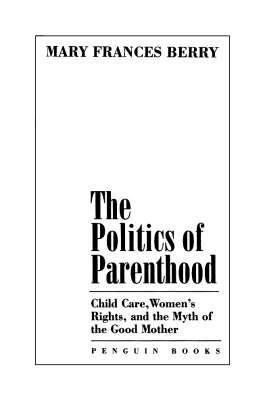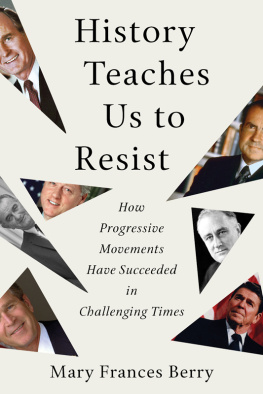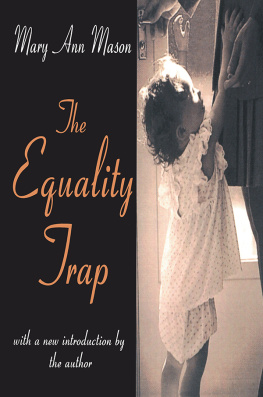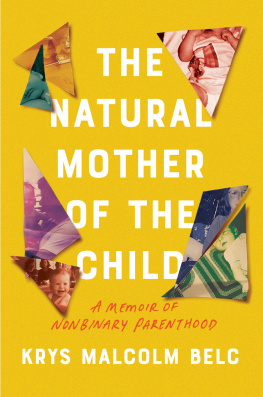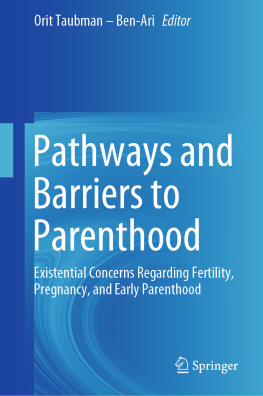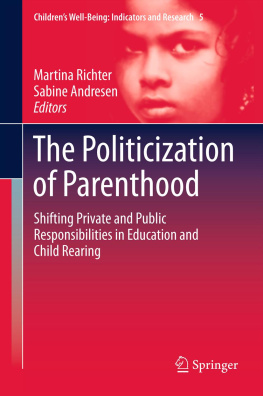Critical acclaim for Mary Frances Berrys landmark study
The Politics of Parenthood
In a rare book, Mary Frances Berry shows that men of the past were more equal parents, and that equal responsibility for children is the basis of gender equality. With the insider knowledge of a Washington veteran, she also exposes the ways in which inequality has been legislated. If the first stage of revolution was proving that women can do what men do, The Politics of Parenthood heralds the next stage: Men can do what women do.
Gloria Steinem
Berry makes her plea to women. She challenges them to take new views of themselves, their relationships, and their potential. Berry posits that only by a sweeping reevaluation of gender roles will women be able to achieve the political and social equality they desire.
Laura Van Tuyl, The Christian Science Monitor
The Politics of Parenthood provides a starting point for future historians. Berrys account poses crucial questions for further debate[she] argues effectively that [the] traditional family model needs to be challenged before women record any real improvements in their career and home lives[and] she is right in calling for a reexamination of these attitudes.
Elsa Walsh, The Washington Post Book World
Forcefulan important overview[and] reference for those involved in both gender battles and the fight for comprehensive child are.
Kirkus Reviews
The Politics of Parenthood is an excellent presentation of social policies [that] are necessary to support todays changing families. This is an important book in these times of reevaluating the roles of men and women in the debate on family values in America. I strongly recommend this book for the general reader as well as policy makers.
Alvin F. Poussaint, M.D., Associate Professor of Psychiatry, Harvard Medical School

PENGUIN BOOKS
THE POLITICS OF PARENTHOOD
Mary Frances Berry is a lawyer and a member of the U.S. Commission on Civil Rights, as well as a former assistant secretary for education in the Department of Health, Education and Welfare. She is currently Geraldine R. Segal Professor of American Social Thought and a professor of history and law at the University of Pennsylvania. Her books include Why ERA Failed and Long Memory.
MARY FRANCES BERRY
The
Politics of
Parenthood
Child Care, Womens
Rights, and the Myth of
the Good Mother
PENGUIN BOOKS
PENGUIN BOOKS
Published by the Penguin Group
Penguin Books USA Inc., 375 Hudson Street,
New York, New York 10014, U.S.A.
Penguin Books Ltd, 27 Wrights Lane, London W8 5TZ, England
Penguin Books Australia Ltd, Ringwood, Victoria, Australia
Penguin Books Canada Ltd, 10 Alcorn Avenue,
Toronto, Ontario, Canada M4V 3B2
Penguin Books (N.Z.) Ltd, 182-190 Wairau Road,
Auckland 10, New Zealand
Penguin Books Ltd, Registered Offices:
Harmondsworth, Middlesex, England
First published in the United States of America by
Viking Penguin, a division of Penguin Books USA Inc., 1993
Published in Penguin Books 1994
10 9 8 7 6 5 4 3 2 1
Copyright Mary Frances Berry, 1993
All rights reserved
THE LIBRARY OF CONGRESS HAS CATALOGUED THE HARDCOVER AS FOLLOWS:
Berry, Mary Frances.
The politics of parenthood: child care, womens rights,
and the myth of the good mother/Mary Frances Berry.
p. cm.
Includes index.
ISBN: 978-1-101-65145-2
1. Child careGovernment policyUnited States.
2. Child care servicesGovernment policyUnited States.
3. WomenEmploymentUnited States.
4. Womens rightsUnited States. 5. Work and familyUnited States.
I. Title.
HQ778.7.U6B49 1993
362.7120973dc20 9250388
Printed in the United States of America
Set in Bodoni
Except in the United States of America, this book is sold subject to the condition that it shall not, by way of trade or otherwise, be lent, re-sold, hired out, or otherwise circulated without the publishers prior consent in any form of binding or cover other than that in which it is published and without a similar condition including this condition being imposed on the subsequent purchaser.
For Mindy
and
Connie and David
Preface and Acknowledgments
Despair compelled me to write this book. Some of my best friends failed to understand that defining women as primarily responsible for child care prevented women from enjoying the equality of rights and access to power they sought.
The idea grew in my University of Pennsylvania seminar in the History of Law and Social Policy. In discussing the history of day care, I discovered that my students, male and female, felt they had few real options. Mothers were destined to care for children and fathers had always been employed outside the home. They thought that women just had to accept the responsibility for child care along with a job and anything else they needed or wanted to do.
I explain in this book that fathers (and even men and women who are not relatives) have cared for children as successfully as mothers or other relatives. The mother-care tradition persists because we are acculturated to accept it and because it reinforces existing power arrangements. The tradition is, however, neither traditional nor necessary.
I owe an enormous debt to the students in my undergraduate and graduate seminars who have contended over the data and the interpretations in this study for the last five years. I also thank my graduate student researchers James Johnson, Herman Graham, and Anne Bailey.
In Washington, Domenic Ruscio put his unparalleled experience with the congressional legislative process at my disposal. Tom Nardone of the Bureau of Labor Statistics was unfailingly helpful in answering my questions about data on womens employment. Martin OConnell of the Population Fertility Branch at the Census Bureau responded cheerfully to my data requests and questions concerning child-care responsibilities. Melissa Goodsight of the Administration of Youth, Families and Children and Terry Herron of the Title XX Social Services Block Grant Program at the Department of Health and Human Services helped me to understand the process for implementing the child-care and welfare-reform legislation.
Over the years, the scholars who commented on this topic at conventions and in departmental seminars helped immensely. I want to thank Joan Hoff, Genna Rae McNeil, Eileen Boris, John Blassingame, Linda Kerber, Joan Scott, Michael Blakeley, Ellen Carol DuBois, Jane DeHart, and Evelyn Brooks-Higginbotham for their comments and suggestions. My colleague, Carroll Smith-Rosenberg, warrants special gratitude for reading and rereading the manuscript as it evolved over time. Mindy Chateauvert read and commented unmercifully. She was my best critic.
I also benefited from being able to talk and listen to a number of remarkable women as this project proceeded. They include Blandina Cardenas Ramirez, Judith Lichtman, Marcia Greenberger, Elaine Jones, Melanne Verveer, Barbara Arnwine, Phyllis Schlafly, Clare Coss, Mindy Shapiro, Carol Muehling Frausto, and Elizabeth Abramowitz. Virginia Insley gave me insight into the history of childrens programs in the federal government, where she directed the Maternal and Child Health programs for so many years. Three male friends also deserve special notice. Roger Wilkins, DeWayne Wickham, and John White kept reminding me that the remedies suggested here are easier said than done.

